CHC30113 Certificate III Early Childhood Education Assignment
VerifiedAdded on 2022/09/06
|19
|2944
|29
Homework Assignment
AI Summary
This document presents a comprehensive solution to an Early Childhood Education assignment, addressing key concepts in child development, health, and safety. It covers a range of topics including the objectives of the National Quality Framework (NQF), the aims and outcomes of the Early Years Learning Framework (EYLF), and the importance of ethical practices in childcare. The assignment explores age-specific sleep patterns, cues for different needs, and appropriate responses. It delves into nutritional requirements for infants and toddlers, including dietary guidelines and safe food practices. The document also examines oral hygiene, hand hygiene protocols, and safety measures to prevent SIDS. Furthermore, it explores emotional, physical, and language development across various age groups, attachment theory, and family routines. It also includes case studies that require applying the learned knowledge to practical scenarios, such as separation anxiety and nappy changing procedures. The assignment emphasizes the importance of environmental changes and their effects on children and the need for sun protection measures. The document provides detailed answers to all the questions in the assessment workbook.
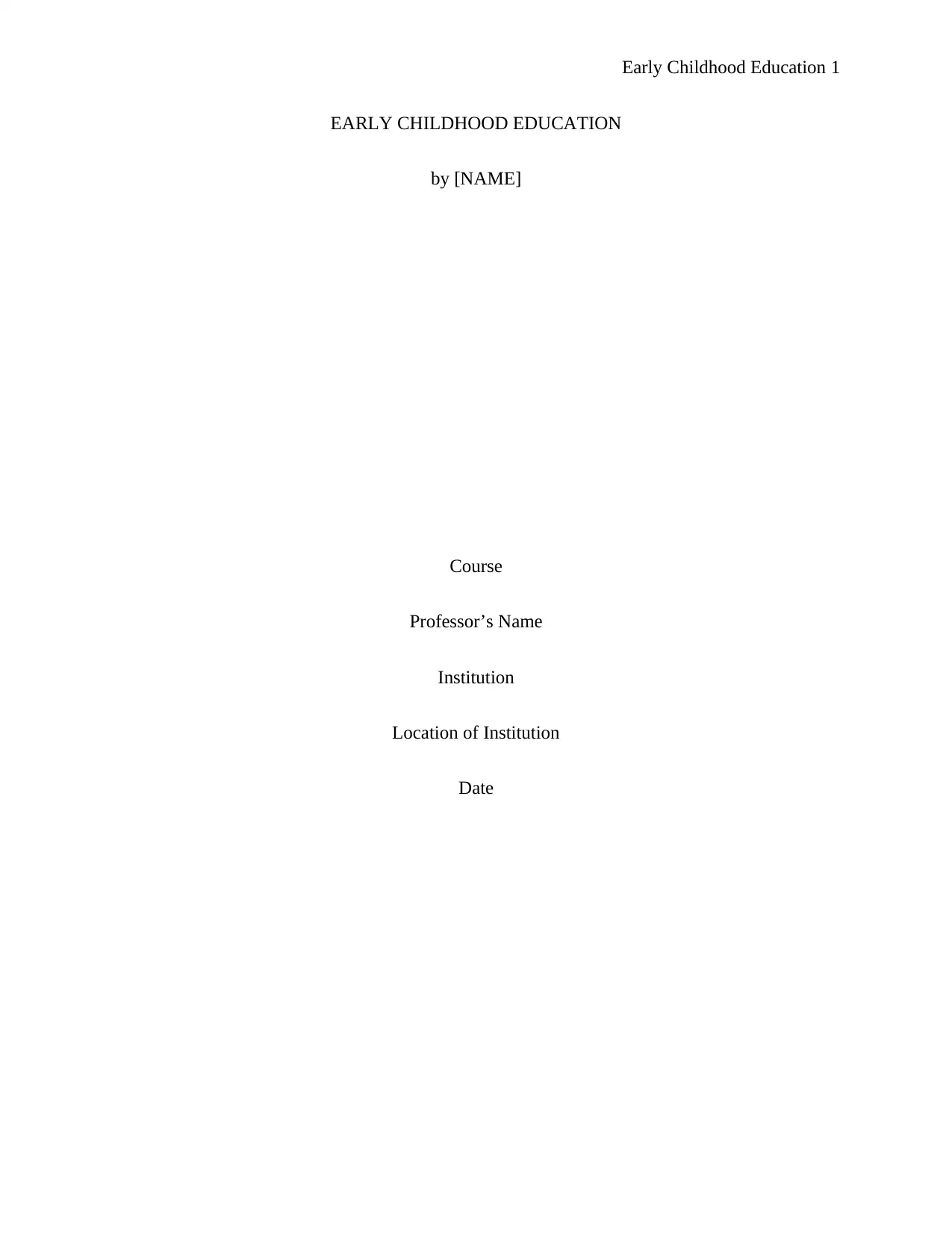
Early Childhood Education 1
EARLY CHILDHOOD EDUCATION
by [NAME]
Course
Professor’s Name
Institution
Location of Institution
Date
EARLY CHILDHOOD EDUCATION
by [NAME]
Course
Professor’s Name
Institution
Location of Institution
Date
Paraphrase This Document
Need a fresh take? Get an instant paraphrase of this document with our AI Paraphraser
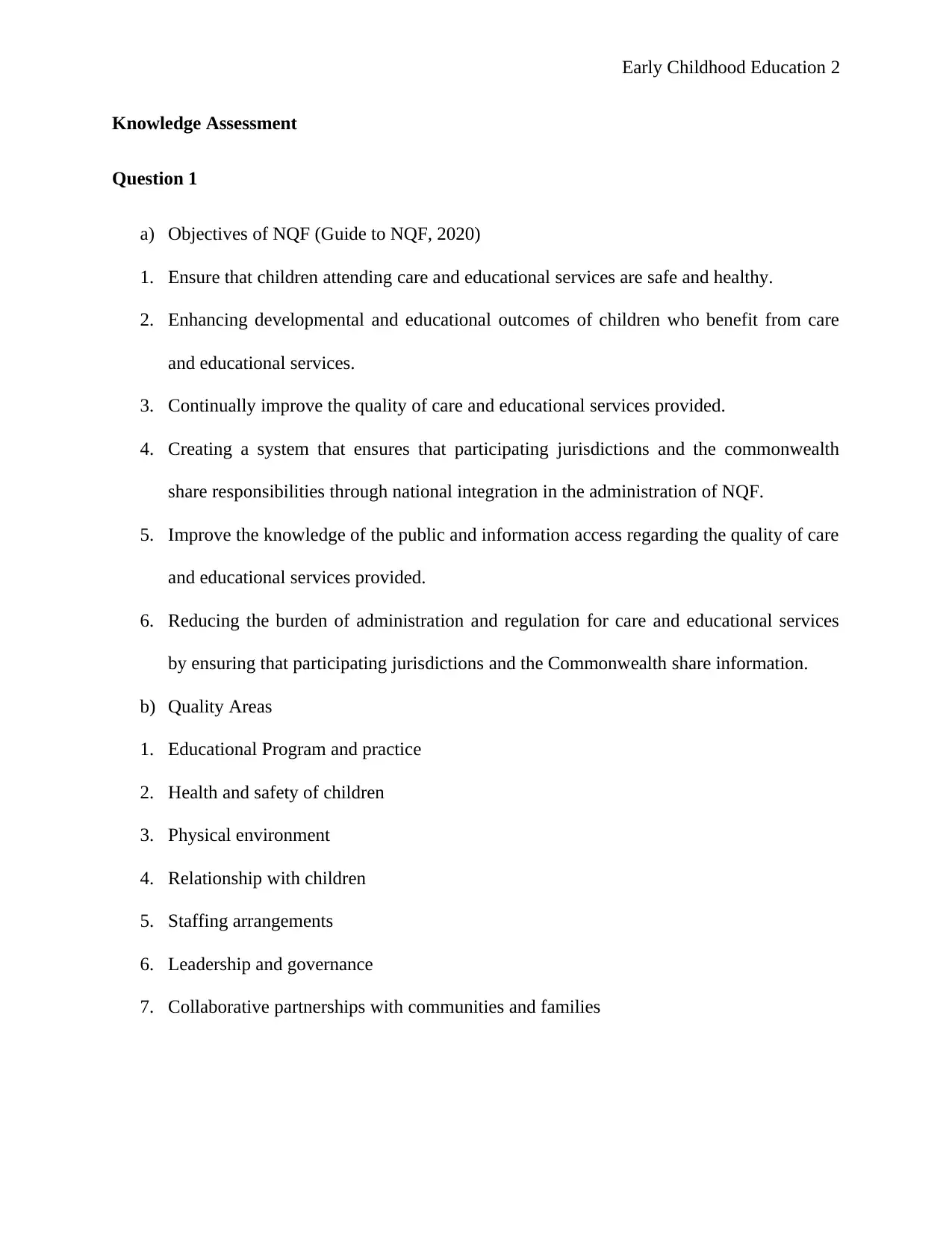
Early Childhood Education 2
Knowledge Assessment
Question 1
a) Objectives of NQF (Guide to NQF, 2020)
1. Ensure that children attending care and educational services are safe and healthy.
2. Enhancing developmental and educational outcomes of children who benefit from care
and educational services.
3. Continually improve the quality of care and educational services provided.
4. Creating a system that ensures that participating jurisdictions and the commonwealth
share responsibilities through national integration in the administration of NQF.
5. Improve the knowledge of the public and information access regarding the quality of care
and educational services provided.
6. Reducing the burden of administration and regulation for care and educational services
by ensuring that participating jurisdictions and the Commonwealth share information.
b) Quality Areas
1. Educational Program and practice
2. Health and safety of children
3. Physical environment
4. Relationship with children
5. Staffing arrangements
6. Leadership and governance
7. Collaborative partnerships with communities and families
Knowledge Assessment
Question 1
a) Objectives of NQF (Guide to NQF, 2020)
1. Ensure that children attending care and educational services are safe and healthy.
2. Enhancing developmental and educational outcomes of children who benefit from care
and educational services.
3. Continually improve the quality of care and educational services provided.
4. Creating a system that ensures that participating jurisdictions and the commonwealth
share responsibilities through national integration in the administration of NQF.
5. Improve the knowledge of the public and information access regarding the quality of care
and educational services provided.
6. Reducing the burden of administration and regulation for care and educational services
by ensuring that participating jurisdictions and the Commonwealth share information.
b) Quality Areas
1. Educational Program and practice
2. Health and safety of children
3. Physical environment
4. Relationship with children
5. Staffing arrangements
6. Leadership and governance
7. Collaborative partnerships with communities and families
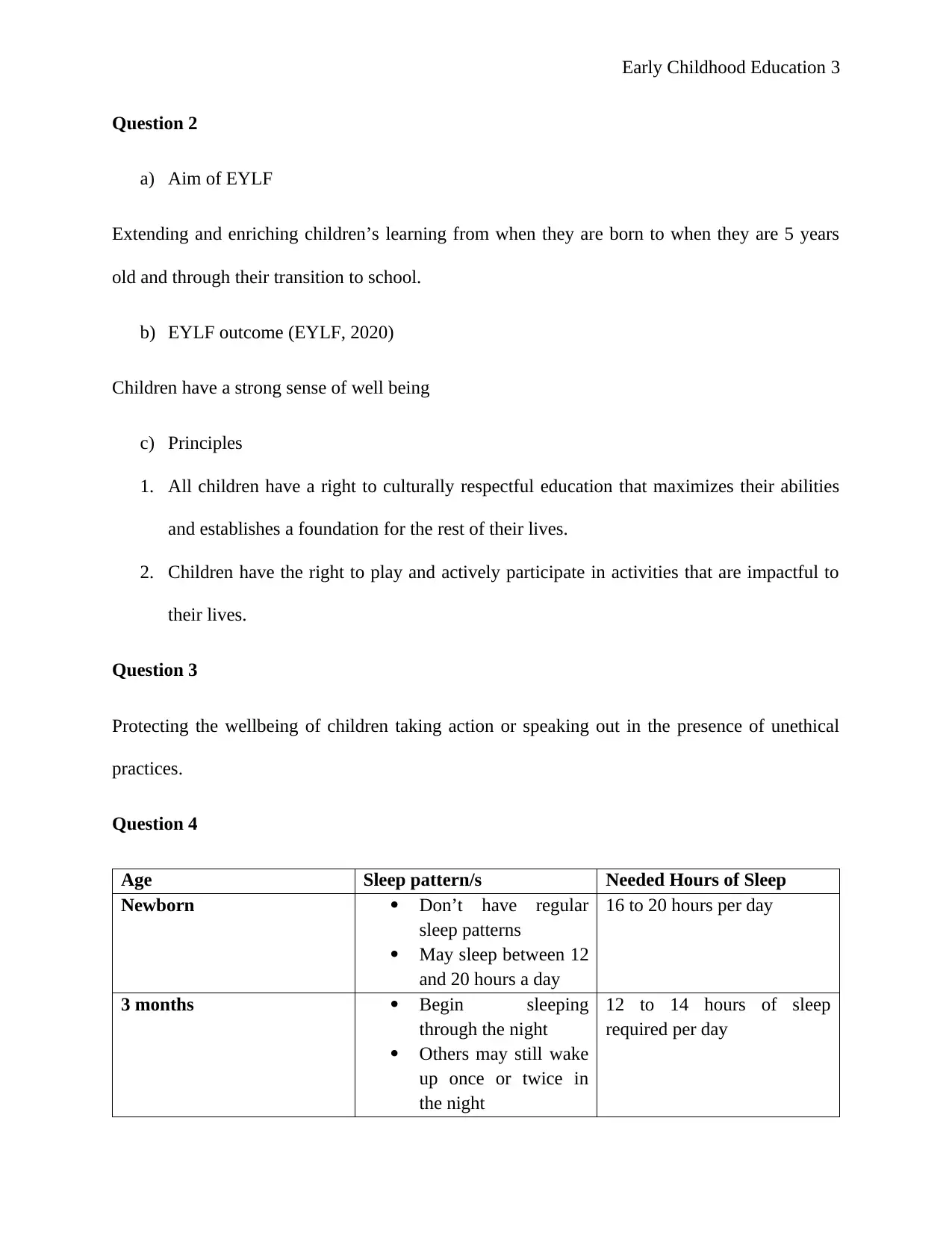
Early Childhood Education 3
Question 2
a) Aim of EYLF
Extending and enriching children’s learning from when they are born to when they are 5 years
old and through their transition to school.
b) EYLF outcome (EYLF, 2020)
Children have a strong sense of well being
c) Principles
1. All children have a right to culturally respectful education that maximizes their abilities
and establishes a foundation for the rest of their lives.
2. Children have the right to play and actively participate in activities that are impactful to
their lives.
Question 3
Protecting the wellbeing of children taking action or speaking out in the presence of unethical
practices.
Question 4
Age Sleep pattern/s Needed Hours of Sleep
Newborn Don’t have regular
sleep patterns
May sleep between 12
and 20 hours a day
16 to 20 hours per day
3 months Begin sleeping
through the night
Others may still wake
up once or twice in
the night
12 to 14 hours of sleep
required per day
Question 2
a) Aim of EYLF
Extending and enriching children’s learning from when they are born to when they are 5 years
old and through their transition to school.
b) EYLF outcome (EYLF, 2020)
Children have a strong sense of well being
c) Principles
1. All children have a right to culturally respectful education that maximizes their abilities
and establishes a foundation for the rest of their lives.
2. Children have the right to play and actively participate in activities that are impactful to
their lives.
Question 3
Protecting the wellbeing of children taking action or speaking out in the presence of unethical
practices.
Question 4
Age Sleep pattern/s Needed Hours of Sleep
Newborn Don’t have regular
sleep patterns
May sleep between 12
and 20 hours a day
16 to 20 hours per day
3 months Begin sleeping
through the night
Others may still wake
up once or twice in
the night
12 to 14 hours of sleep
required per day
⊘ This is a preview!⊘
Do you want full access?
Subscribe today to unlock all pages.

Trusted by 1+ million students worldwide
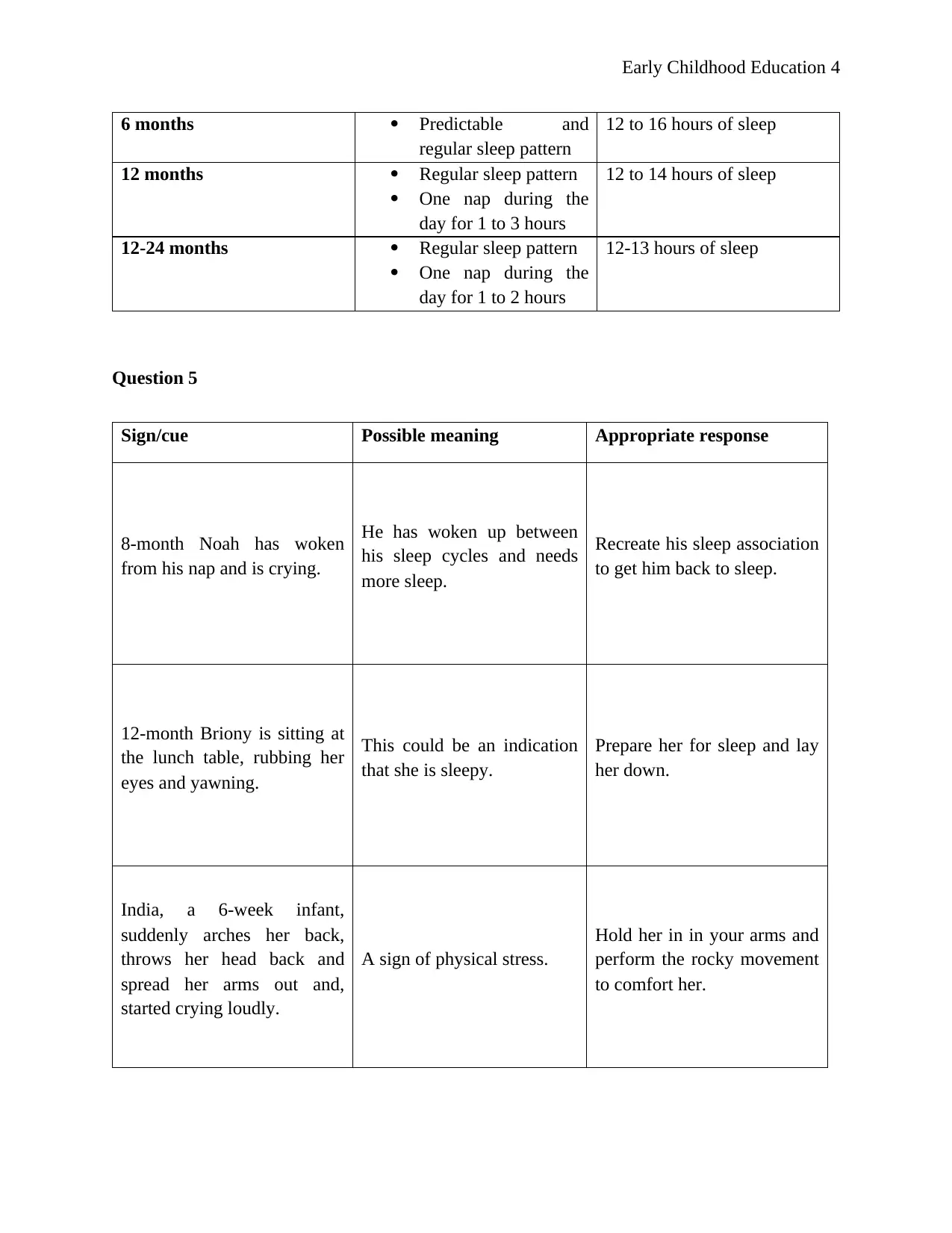
Early Childhood Education 4
6 months Predictable and
regular sleep pattern
12 to 16 hours of sleep
12 months Regular sleep pattern
One nap during the
day for 1 to 3 hours
12 to 14 hours of sleep
12-24 months Regular sleep pattern
One nap during the
day for 1 to 2 hours
12-13 hours of sleep
Question 5
Sign/cue Possible meaning Appropriate response
8-month Noah has woken
from his nap and is crying.
He has woken up between
his sleep cycles and needs
more sleep.
Recreate his sleep association
to get him back to sleep.
12-month Briony is sitting at
the lunch table, rubbing her
eyes and yawning.
This could be an indication
that she is sleepy.
Prepare her for sleep and lay
her down.
India, a 6-week infant,
suddenly arches her back,
throws her head back and
spread her arms out and,
started crying loudly.
A sign of physical stress.
Hold her in in your arms and
perform the rocky movement
to comfort her.
6 months Predictable and
regular sleep pattern
12 to 16 hours of sleep
12 months Regular sleep pattern
One nap during the
day for 1 to 3 hours
12 to 14 hours of sleep
12-24 months Regular sleep pattern
One nap during the
day for 1 to 2 hours
12-13 hours of sleep
Question 5
Sign/cue Possible meaning Appropriate response
8-month Noah has woken
from his nap and is crying.
He has woken up between
his sleep cycles and needs
more sleep.
Recreate his sleep association
to get him back to sleep.
12-month Briony is sitting at
the lunch table, rubbing her
eyes and yawning.
This could be an indication
that she is sleepy.
Prepare her for sleep and lay
her down.
India, a 6-week infant,
suddenly arches her back,
throws her head back and
spread her arms out and,
started crying loudly.
A sign of physical stress.
Hold her in in your arms and
perform the rocky movement
to comfort her.
Paraphrase This Document
Need a fresh take? Get an instant paraphrase of this document with our AI Paraphraser
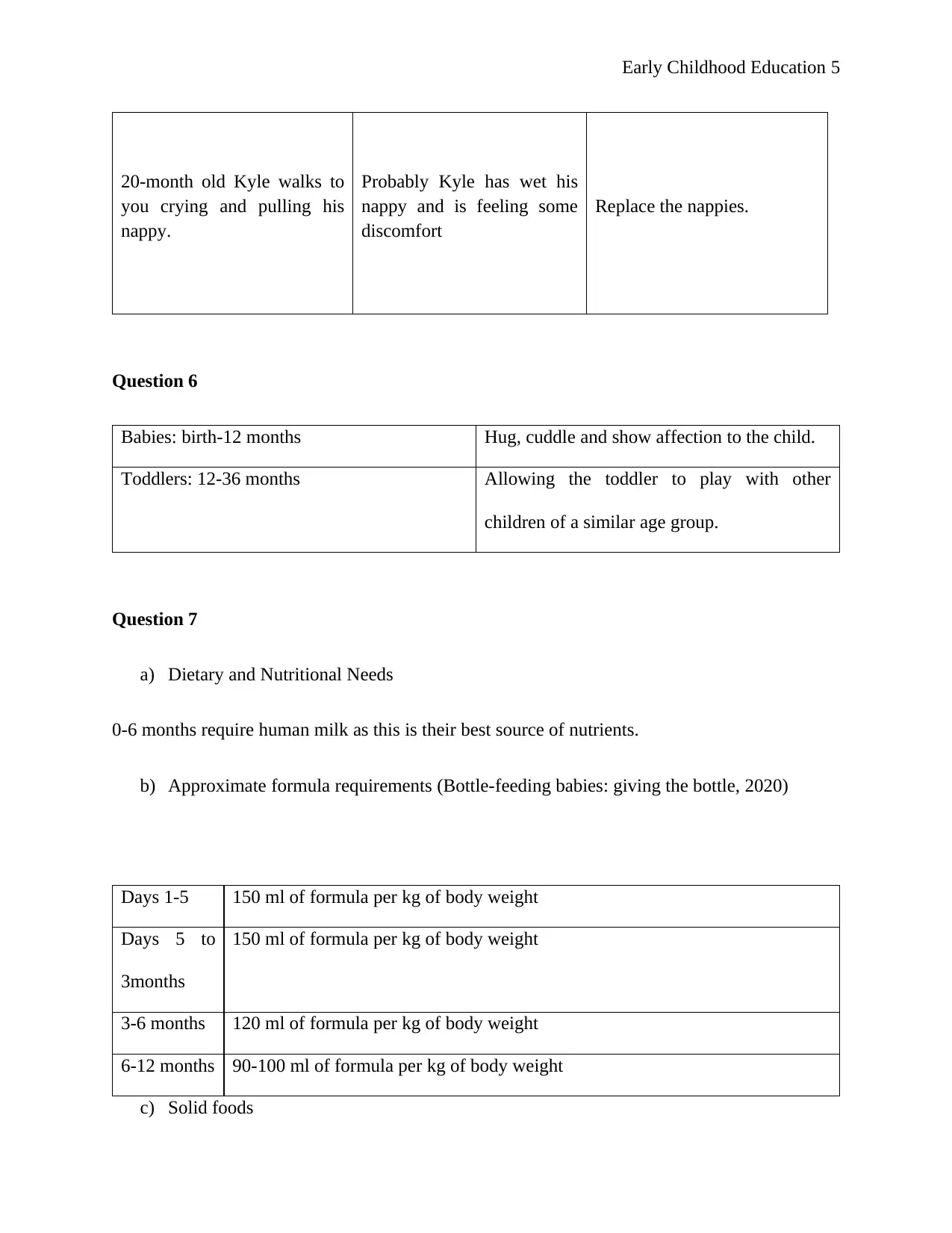
Early Childhood Education 5
20-month old Kyle walks to
you crying and pulling his
nappy.
Probably Kyle has wet his
nappy and is feeling some
discomfort
Replace the nappies.
Question 6
Babies: birth-12 months Hug, cuddle and show affection to the child.
Toddlers: 12-36 months Allowing the toddler to play with other
children of a similar age group.
Question 7
a) Dietary and Nutritional Needs
0-6 months require human milk as this is their best source of nutrients.
b) Approximate formula requirements (Bottle-feeding babies: giving the bottle, 2020)
Days 1-5 150 ml of formula per kg of body weight
Days 5 to
3months
150 ml of formula per kg of body weight
3-6 months 120 ml of formula per kg of body weight
6-12 months 90-100 ml of formula per kg of body weight
c) Solid foods
20-month old Kyle walks to
you crying and pulling his
nappy.
Probably Kyle has wet his
nappy and is feeling some
discomfort
Replace the nappies.
Question 6
Babies: birth-12 months Hug, cuddle and show affection to the child.
Toddlers: 12-36 months Allowing the toddler to play with other
children of a similar age group.
Question 7
a) Dietary and Nutritional Needs
0-6 months require human milk as this is their best source of nutrients.
b) Approximate formula requirements (Bottle-feeding babies: giving the bottle, 2020)
Days 1-5 150 ml of formula per kg of body weight
Days 5 to
3months
150 ml of formula per kg of body weight
3-6 months 120 ml of formula per kg of body weight
6-12 months 90-100 ml of formula per kg of body weight
c) Solid foods
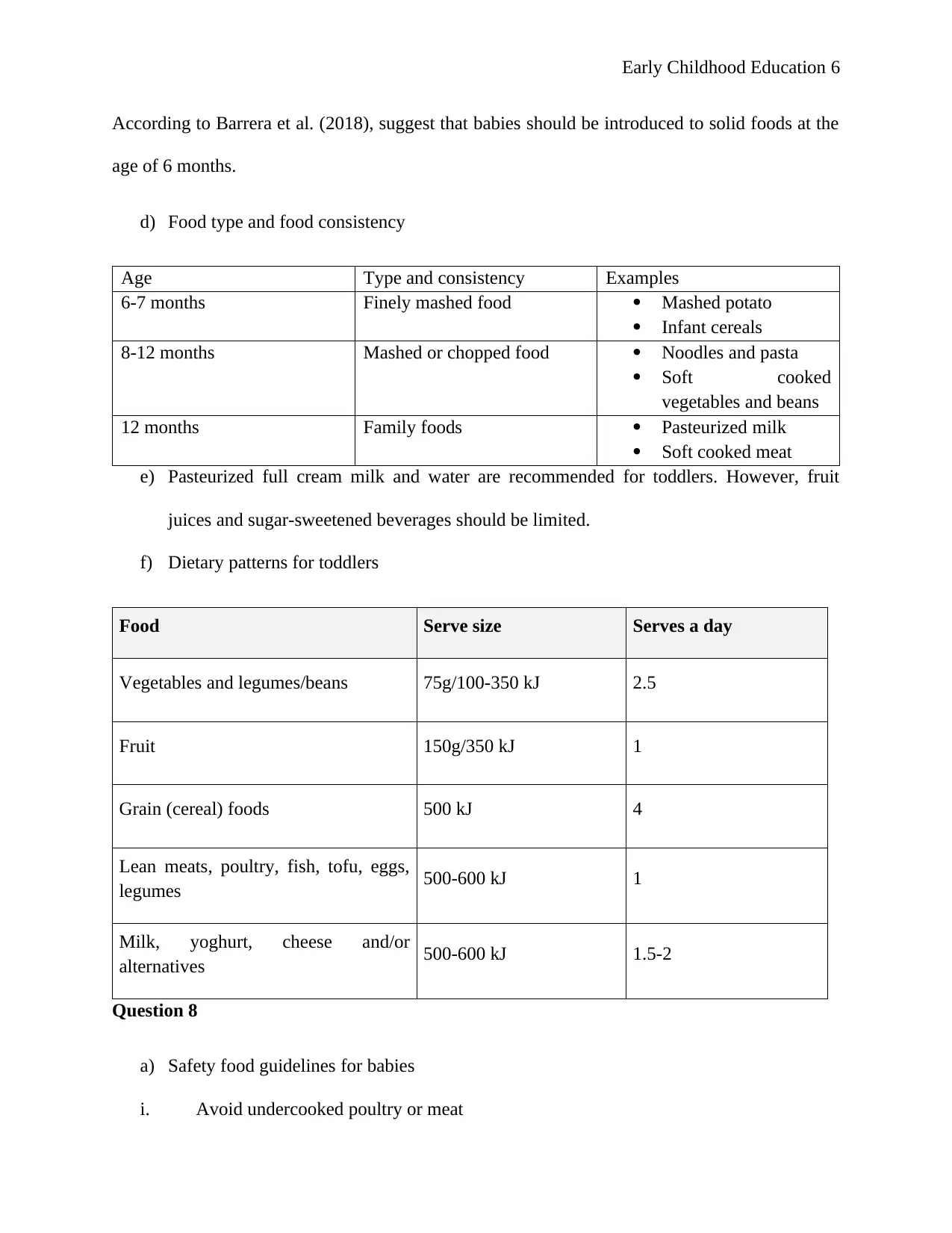
Early Childhood Education 6
According to Barrera et al. (2018), suggest that babies should be introduced to solid foods at the
age of 6 months.
d) Food type and food consistency
Age Type and consistency Examples
6-7 months Finely mashed food Mashed potato
Infant cereals
8-12 months Mashed or chopped food Noodles and pasta
Soft cooked
vegetables and beans
12 months Family foods Pasteurized milk
Soft cooked meat
e) Pasteurized full cream milk and water are recommended for toddlers. However, fruit
juices and sugar-sweetened beverages should be limited.
f) Dietary patterns for toddlers
Food Serve size Serves a day
Vegetables and legumes/beans 75g/100-350 kJ 2.5
Fruit 150g/350 kJ 1
Grain (cereal) foods 500 kJ 4
Lean meats, poultry, fish, tofu, eggs,
legumes 500-600 kJ 1
Milk, yoghurt, cheese and/or
alternatives 500-600 kJ 1.5-2
Question 8
a) Safety food guidelines for babies
i. Avoid undercooked poultry or meat
According to Barrera et al. (2018), suggest that babies should be introduced to solid foods at the
age of 6 months.
d) Food type and food consistency
Age Type and consistency Examples
6-7 months Finely mashed food Mashed potato
Infant cereals
8-12 months Mashed or chopped food Noodles and pasta
Soft cooked
vegetables and beans
12 months Family foods Pasteurized milk
Soft cooked meat
e) Pasteurized full cream milk and water are recommended for toddlers. However, fruit
juices and sugar-sweetened beverages should be limited.
f) Dietary patterns for toddlers
Food Serve size Serves a day
Vegetables and legumes/beans 75g/100-350 kJ 2.5
Fruit 150g/350 kJ 1
Grain (cereal) foods 500 kJ 4
Lean meats, poultry, fish, tofu, eggs,
legumes 500-600 kJ 1
Milk, yoghurt, cheese and/or
alternatives 500-600 kJ 1.5-2
Question 8
a) Safety food guidelines for babies
i. Avoid undercooked poultry or meat
⊘ This is a preview!⊘
Do you want full access?
Subscribe today to unlock all pages.

Trusted by 1+ million students worldwide
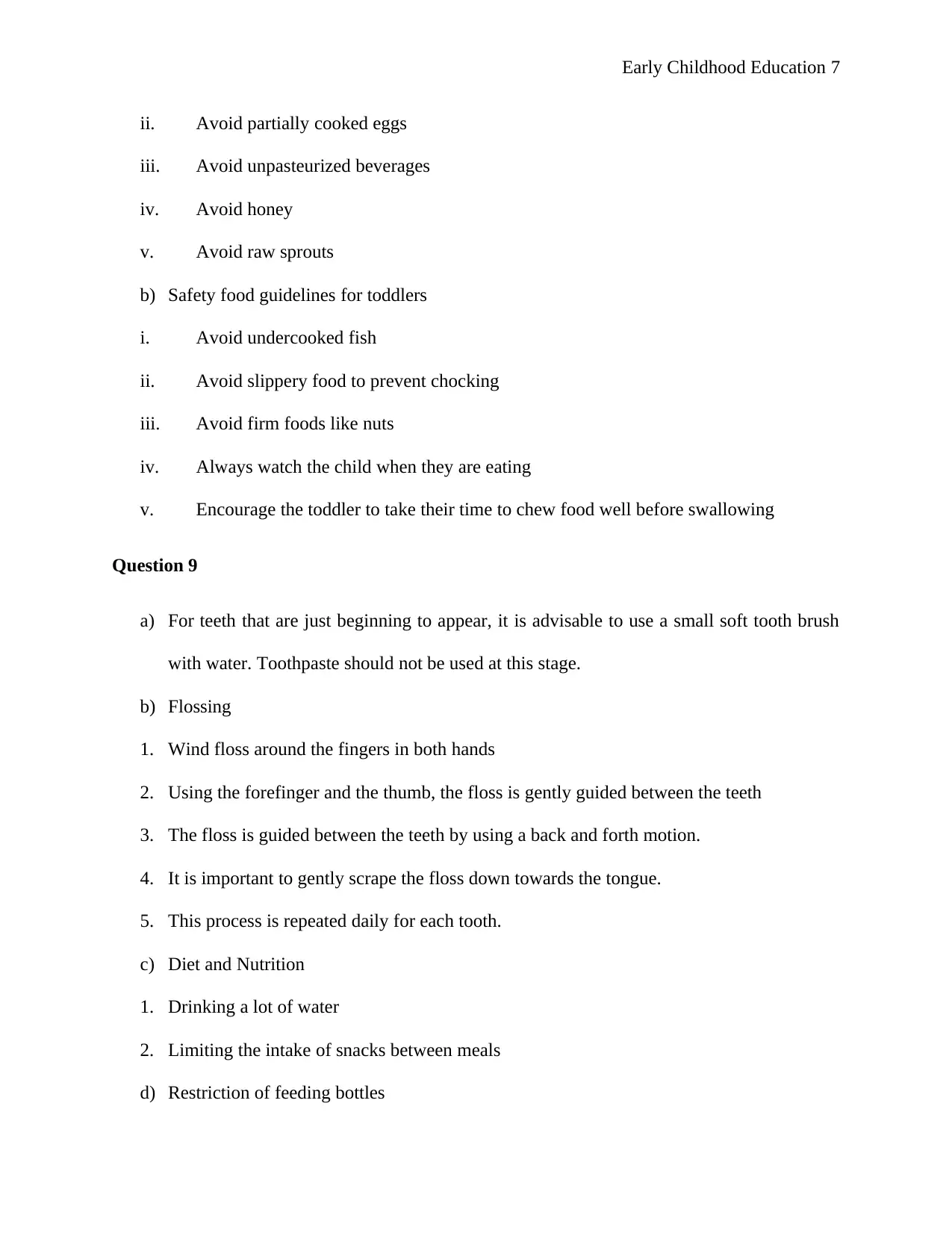
Early Childhood Education 7
ii. Avoid partially cooked eggs
iii. Avoid unpasteurized beverages
iv. Avoid honey
v. Avoid raw sprouts
b) Safety food guidelines for toddlers
i. Avoid undercooked fish
ii. Avoid slippery food to prevent chocking
iii. Avoid firm foods like nuts
iv. Always watch the child when they are eating
v. Encourage the toddler to take their time to chew food well before swallowing
Question 9
a) For teeth that are just beginning to appear, it is advisable to use a small soft tooth brush
with water. Toothpaste should not be used at this stage.
b) Flossing
1. Wind floss around the fingers in both hands
2. Using the forefinger and the thumb, the floss is gently guided between the teeth
3. The floss is guided between the teeth by using a back and forth motion.
4. It is important to gently scrape the floss down towards the tongue.
5. This process is repeated daily for each tooth.
c) Diet and Nutrition
1. Drinking a lot of water
2. Limiting the intake of snacks between meals
d) Restriction of feeding bottles
ii. Avoid partially cooked eggs
iii. Avoid unpasteurized beverages
iv. Avoid honey
v. Avoid raw sprouts
b) Safety food guidelines for toddlers
i. Avoid undercooked fish
ii. Avoid slippery food to prevent chocking
iii. Avoid firm foods like nuts
iv. Always watch the child when they are eating
v. Encourage the toddler to take their time to chew food well before swallowing
Question 9
a) For teeth that are just beginning to appear, it is advisable to use a small soft tooth brush
with water. Toothpaste should not be used at this stage.
b) Flossing
1. Wind floss around the fingers in both hands
2. Using the forefinger and the thumb, the floss is gently guided between the teeth
3. The floss is guided between the teeth by using a back and forth motion.
4. It is important to gently scrape the floss down towards the tongue.
5. This process is repeated daily for each tooth.
c) Diet and Nutrition
1. Drinking a lot of water
2. Limiting the intake of snacks between meals
d) Restriction of feeding bottles
Paraphrase This Document
Need a fresh take? Get an instant paraphrase of this document with our AI Paraphraser
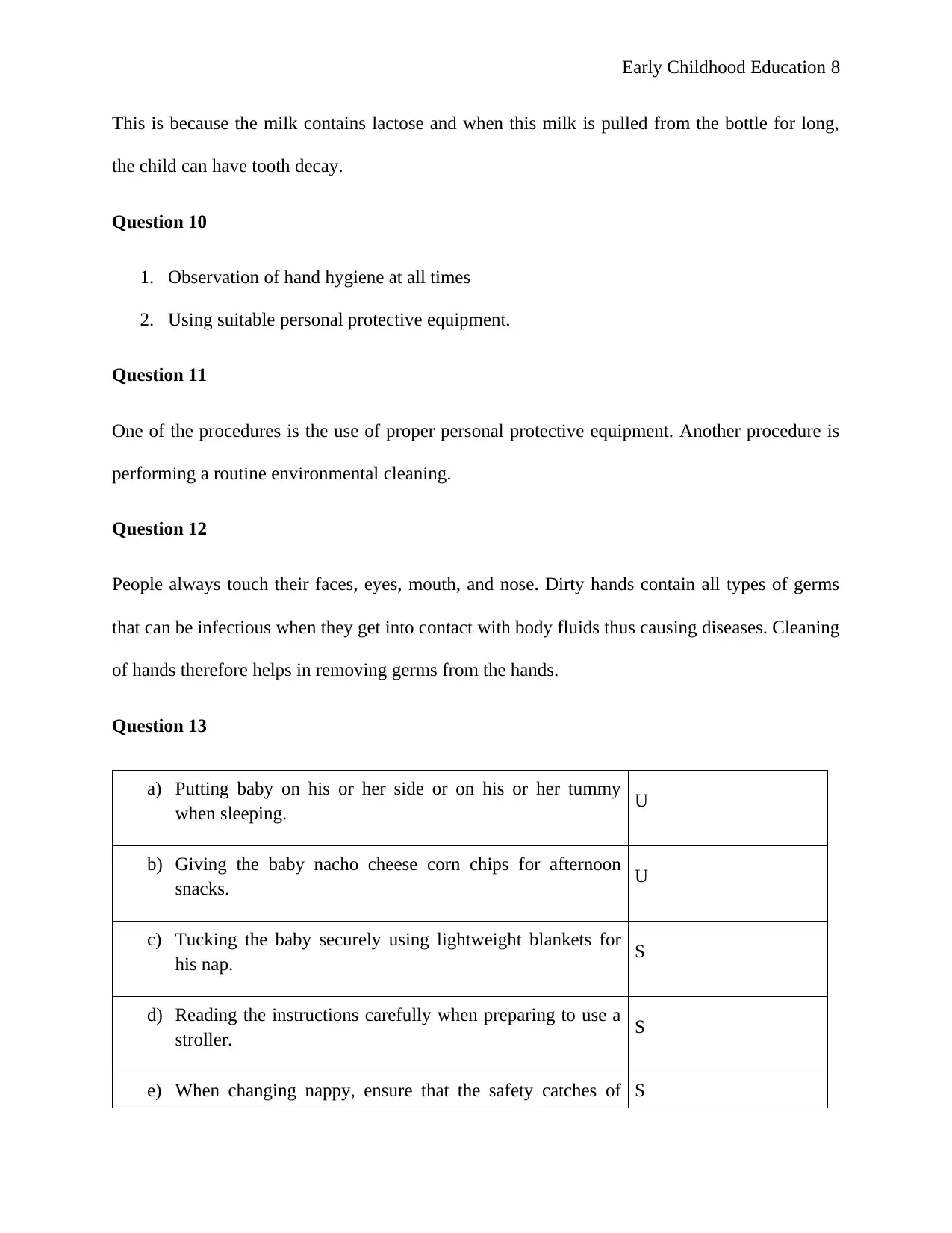
Early Childhood Education 8
This is because the milk contains lactose and when this milk is pulled from the bottle for long,
the child can have tooth decay.
Question 10
1. Observation of hand hygiene at all times
2. Using suitable personal protective equipment.
Question 11
One of the procedures is the use of proper personal protective equipment. Another procedure is
performing a routine environmental cleaning.
Question 12
People always touch their faces, eyes, mouth, and nose. Dirty hands contain all types of germs
that can be infectious when they get into contact with body fluids thus causing diseases. Cleaning
of hands therefore helps in removing germs from the hands.
Question 13
a) Putting baby on his or her side or on his or her tummy
when sleeping. U
b) Giving the baby nacho cheese corn chips for afternoon
snacks. U
c) Tucking the baby securely using lightweight blankets for
his nap. S
d) Reading the instructions carefully when preparing to use a
stroller. S
e) When changing nappy, ensure that the safety catches of S
This is because the milk contains lactose and when this milk is pulled from the bottle for long,
the child can have tooth decay.
Question 10
1. Observation of hand hygiene at all times
2. Using suitable personal protective equipment.
Question 11
One of the procedures is the use of proper personal protective equipment. Another procedure is
performing a routine environmental cleaning.
Question 12
People always touch their faces, eyes, mouth, and nose. Dirty hands contain all types of germs
that can be infectious when they get into contact with body fluids thus causing diseases. Cleaning
of hands therefore helps in removing germs from the hands.
Question 13
a) Putting baby on his or her side or on his or her tummy
when sleeping. U
b) Giving the baby nacho cheese corn chips for afternoon
snacks. U
c) Tucking the baby securely using lightweight blankets for
his nap. S
d) Reading the instructions carefully when preparing to use a
stroller. S
e) When changing nappy, ensure that the safety catches of S
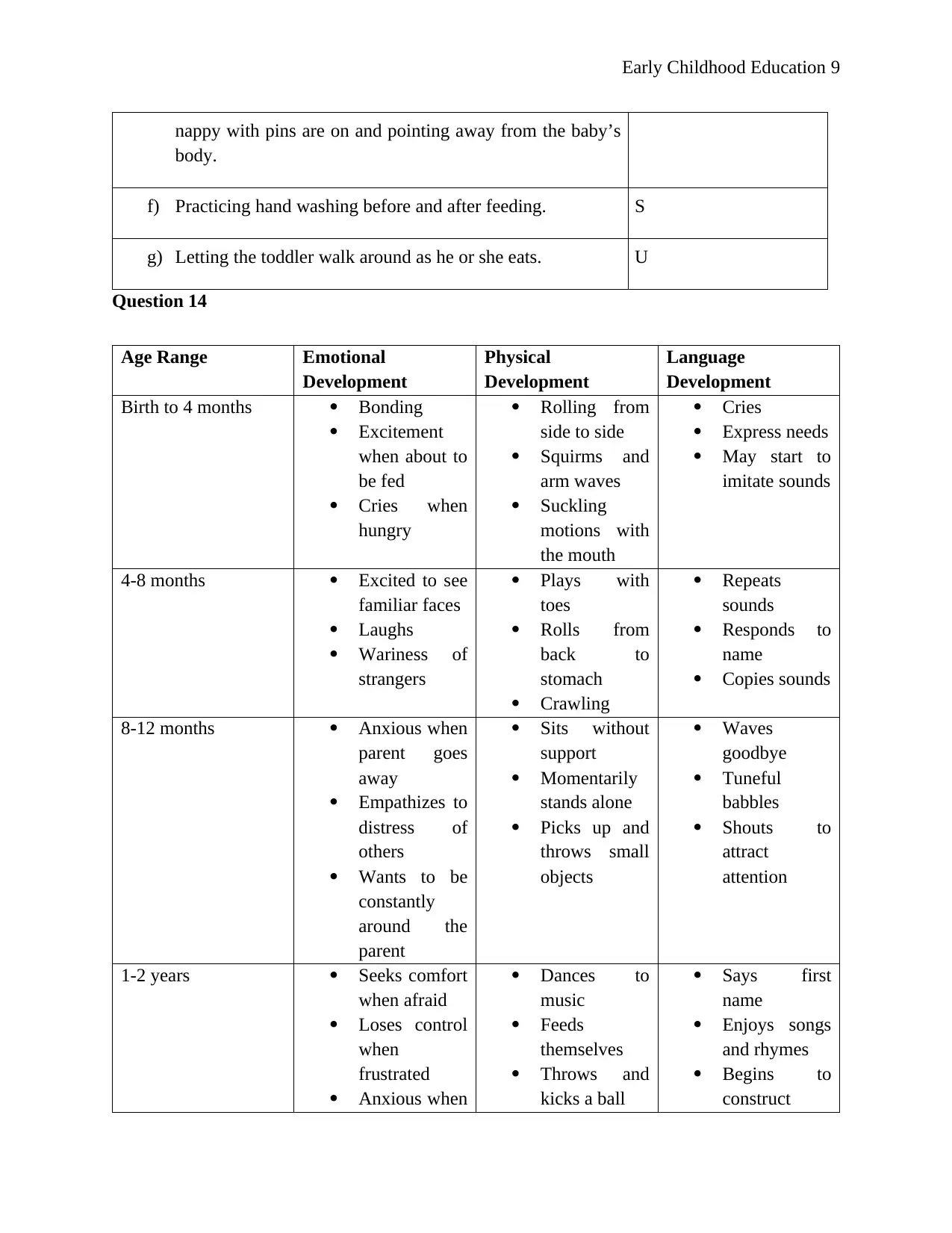
Early Childhood Education 9
nappy with pins are on and pointing away from the baby’s
body.
f) Practicing hand washing before and after feeding. S
g) Letting the toddler walk around as he or she eats. U
Question 14
Age Range Emotional
Development
Physical
Development
Language
Development
Birth to 4 months Bonding
Excitement
when about to
be fed
Cries when
hungry
Rolling from
side to side
Squirms and
arm waves
Suckling
motions with
the mouth
Cries
Express needs
May start to
imitate sounds
4-8 months Excited to see
familiar faces
Laughs
Wariness of
strangers
Plays with
toes
Rolls from
back to
stomach
Crawling
Repeats
sounds
Responds to
name
Copies sounds
8-12 months Anxious when
parent goes
away
Empathizes to
distress of
others
Wants to be
constantly
around the
parent
Sits without
support
Momentarily
stands alone
Picks up and
throws small
objects
Waves
goodbye
Tuneful
babbles
Shouts to
attract
attention
1-2 years Seeks comfort
when afraid
Loses control
when
frustrated
Anxious when
Dances to
music
Feeds
themselves
Throws and
kicks a ball
Says first
name
Enjoys songs
and rhymes
Begins to
construct
nappy with pins are on and pointing away from the baby’s
body.
f) Practicing hand washing before and after feeding. S
g) Letting the toddler walk around as he or she eats. U
Question 14
Age Range Emotional
Development
Physical
Development
Language
Development
Birth to 4 months Bonding
Excitement
when about to
be fed
Cries when
hungry
Rolling from
side to side
Squirms and
arm waves
Suckling
motions with
the mouth
Cries
Express needs
May start to
imitate sounds
4-8 months Excited to see
familiar faces
Laughs
Wariness of
strangers
Plays with
toes
Rolls from
back to
stomach
Crawling
Repeats
sounds
Responds to
name
Copies sounds
8-12 months Anxious when
parent goes
away
Empathizes to
distress of
others
Wants to be
constantly
around the
parent
Sits without
support
Momentarily
stands alone
Picks up and
throws small
objects
Waves
goodbye
Tuneful
babbles
Shouts to
attract
attention
1-2 years Seeks comfort
when afraid
Loses control
when
frustrated
Anxious when
Dances to
music
Feeds
themselves
Throws and
kicks a ball
Says first
name
Enjoys songs
and rhymes
Begins to
construct
⊘ This is a preview!⊘
Do you want full access?
Subscribe today to unlock all pages.

Trusted by 1+ million students worldwide
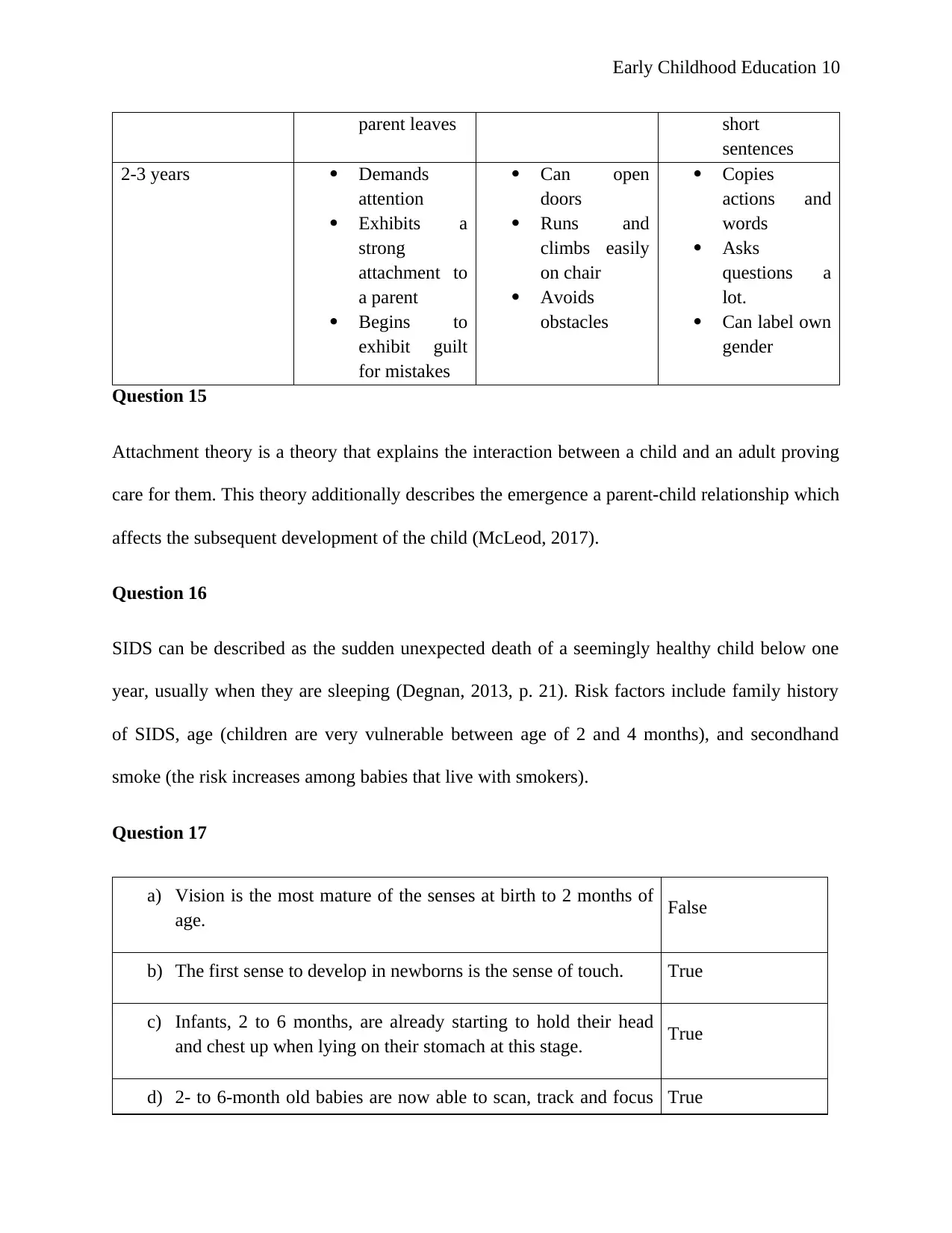
Early Childhood Education 10
parent leaves short
sentences
2-3 years Demands
attention
Exhibits a
strong
attachment to
a parent
Begins to
exhibit guilt
for mistakes
Can open
doors
Runs and
climbs easily
on chair
Avoids
obstacles
Copies
actions and
words
Asks
questions a
lot.
Can label own
gender
Question 15
Attachment theory is a theory that explains the interaction between a child and an adult proving
care for them. This theory additionally describes the emergence a parent-child relationship which
affects the subsequent development of the child (McLeod, 2017).
Question 16
SIDS can be described as the sudden unexpected death of a seemingly healthy child below one
year, usually when they are sleeping (Degnan, 2013, p. 21). Risk factors include family history
of SIDS, age (children are very vulnerable between age of 2 and 4 months), and secondhand
smoke (the risk increases among babies that live with smokers).
Question 17
a) Vision is the most mature of the senses at birth to 2 months of
age. False
b) The first sense to develop in newborns is the sense of touch. True
c) Infants, 2 to 6 months, are already starting to hold their head
and chest up when lying on their stomach at this stage. True
d) 2- to 6-month old babies are now able to scan, track and focus True
parent leaves short
sentences
2-3 years Demands
attention
Exhibits a
strong
attachment to
a parent
Begins to
exhibit guilt
for mistakes
Can open
doors
Runs and
climbs easily
on chair
Avoids
obstacles
Copies
actions and
words
Asks
questions a
lot.
Can label own
gender
Question 15
Attachment theory is a theory that explains the interaction between a child and an adult proving
care for them. This theory additionally describes the emergence a parent-child relationship which
affects the subsequent development of the child (McLeod, 2017).
Question 16
SIDS can be described as the sudden unexpected death of a seemingly healthy child below one
year, usually when they are sleeping (Degnan, 2013, p. 21). Risk factors include family history
of SIDS, age (children are very vulnerable between age of 2 and 4 months), and secondhand
smoke (the risk increases among babies that live with smokers).
Question 17
a) Vision is the most mature of the senses at birth to 2 months of
age. False
b) The first sense to develop in newborns is the sense of touch. True
c) Infants, 2 to 6 months, are already starting to hold their head
and chest up when lying on their stomach at this stage. True
d) 2- to 6-month old babies are now able to scan, track and focus True
Paraphrase This Document
Need a fresh take? Get an instant paraphrase of this document with our AI Paraphraser
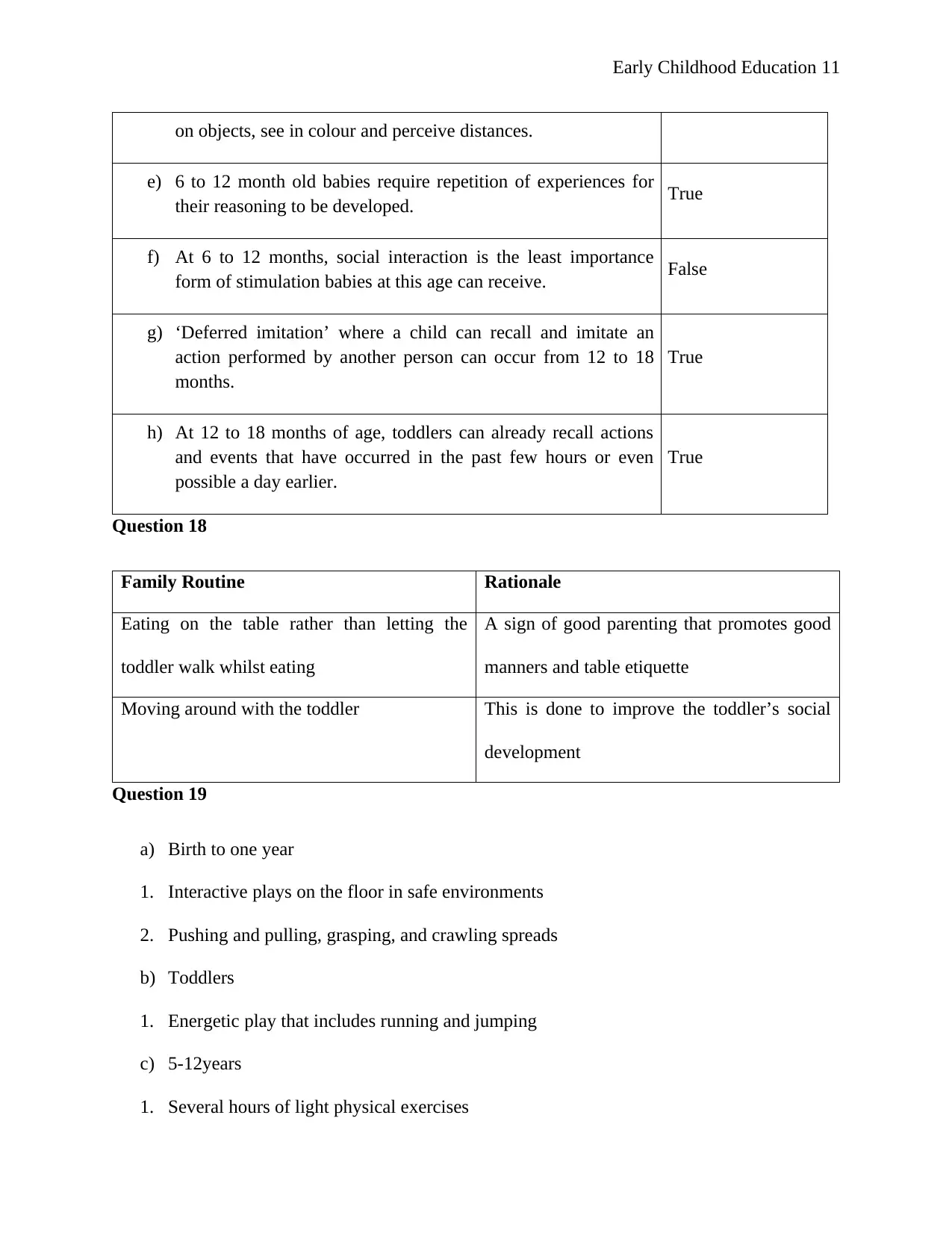
Early Childhood Education 11
on objects, see in colour and perceive distances.
e) 6 to 12 month old babies require repetition of experiences for
their reasoning to be developed. True
f) At 6 to 12 months, social interaction is the least importance
form of stimulation babies at this age can receive. False
g) ‘Deferred imitation’ where a child can recall and imitate an
action performed by another person can occur from 12 to 18
months.
True
h) At 12 to 18 months of age, toddlers can already recall actions
and events that have occurred in the past few hours or even
possible a day earlier.
True
Question 18
Family Routine Rationale
Eating on the table rather than letting the
toddler walk whilst eating
A sign of good parenting that promotes good
manners and table etiquette
Moving around with the toddler This is done to improve the toddler’s social
development
Question 19
a) Birth to one year
1. Interactive plays on the floor in safe environments
2. Pushing and pulling, grasping, and crawling spreads
b) Toddlers
1. Energetic play that includes running and jumping
c) 5-12years
1. Several hours of light physical exercises
on objects, see in colour and perceive distances.
e) 6 to 12 month old babies require repetition of experiences for
their reasoning to be developed. True
f) At 6 to 12 months, social interaction is the least importance
form of stimulation babies at this age can receive. False
g) ‘Deferred imitation’ where a child can recall and imitate an
action performed by another person can occur from 12 to 18
months.
True
h) At 12 to 18 months of age, toddlers can already recall actions
and events that have occurred in the past few hours or even
possible a day earlier.
True
Question 18
Family Routine Rationale
Eating on the table rather than letting the
toddler walk whilst eating
A sign of good parenting that promotes good
manners and table etiquette
Moving around with the toddler This is done to improve the toddler’s social
development
Question 19
a) Birth to one year
1. Interactive plays on the floor in safe environments
2. Pushing and pulling, grasping, and crawling spreads
b) Toddlers
1. Energetic play that includes running and jumping
c) 5-12years
1. Several hours of light physical exercises
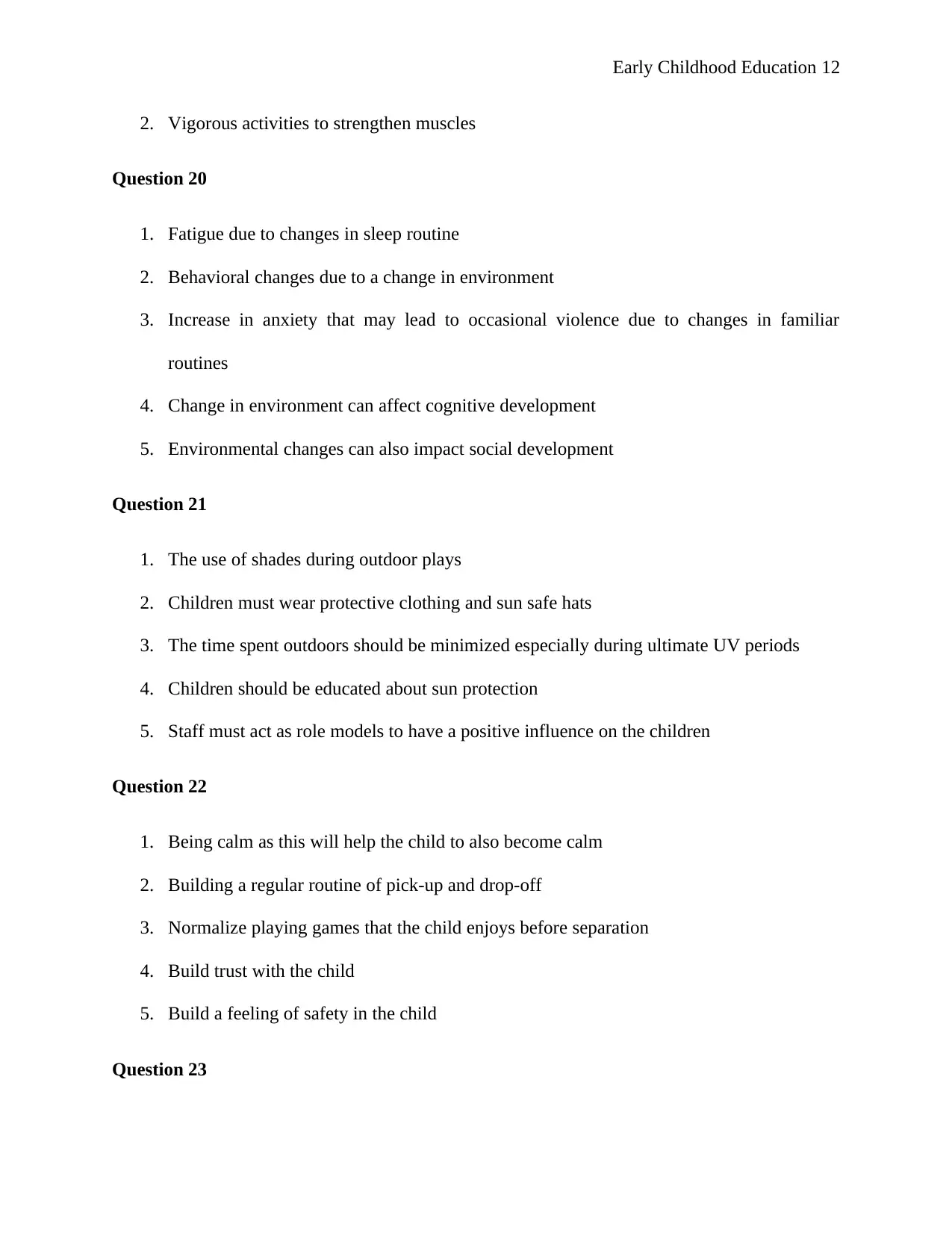
Early Childhood Education 12
2. Vigorous activities to strengthen muscles
Question 20
1. Fatigue due to changes in sleep routine
2. Behavioral changes due to a change in environment
3. Increase in anxiety that may lead to occasional violence due to changes in familiar
routines
4. Change in environment can affect cognitive development
5. Environmental changes can also impact social development
Question 21
1. The use of shades during outdoor plays
2. Children must wear protective clothing and sun safe hats
3. The time spent outdoors should be minimized especially during ultimate UV periods
4. Children should be educated about sun protection
5. Staff must act as role models to have a positive influence on the children
Question 22
1. Being calm as this will help the child to also become calm
2. Building a regular routine of pick-up and drop-off
3. Normalize playing games that the child enjoys before separation
4. Build trust with the child
5. Build a feeling of safety in the child
Question 23
2. Vigorous activities to strengthen muscles
Question 20
1. Fatigue due to changes in sleep routine
2. Behavioral changes due to a change in environment
3. Increase in anxiety that may lead to occasional violence due to changes in familiar
routines
4. Change in environment can affect cognitive development
5. Environmental changes can also impact social development
Question 21
1. The use of shades during outdoor plays
2. Children must wear protective clothing and sun safe hats
3. The time spent outdoors should be minimized especially during ultimate UV periods
4. Children should be educated about sun protection
5. Staff must act as role models to have a positive influence on the children
Question 22
1. Being calm as this will help the child to also become calm
2. Building a regular routine of pick-up and drop-off
3. Normalize playing games that the child enjoys before separation
4. Build trust with the child
5. Build a feeling of safety in the child
Question 23
⊘ This is a preview!⊘
Do you want full access?
Subscribe today to unlock all pages.

Trusted by 1+ million students worldwide
1 out of 19
Your All-in-One AI-Powered Toolkit for Academic Success.
+13062052269
info@desklib.com
Available 24*7 on WhatsApp / Email
![[object Object]](/_next/static/media/star-bottom.7253800d.svg)
Unlock your academic potential
Copyright © 2020–2026 A2Z Services. All Rights Reserved. Developed and managed by ZUCOL.


